Forgotten Cross
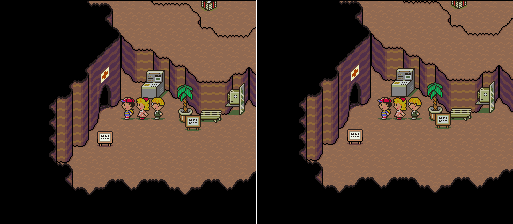 |
Throughout the game, we’ve seen red crosses get removed left and right. Here, we see one that didn’t get removed at all.
Similar to the one in Burglin Park, maybe the legal department gave the okay on this one because it’s not displayed straight-on and/or is slightly obscured. Or maybe they just accidentally forgot to take this one out?
Dungeon Creation Theory
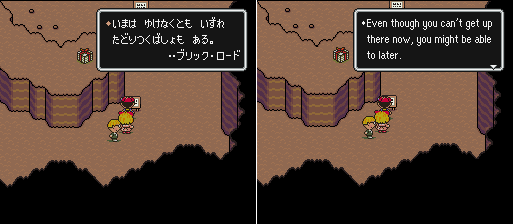 |
Many of the signs in Dungeon Man talk about dungeon-building theory – how to set up dungeons in interesting ways, in other words. Sometimes the phrasing of the signs in EarthBound loses sight of that though, giving instead specific info about this specific dungeon.
For example, in this particular case, the Japanese text says something like, “Sometimes there are places you can’t reach at the moment, but that you will be able to in time.”
EarthBound’s version ignores the “general theory” purpose of the text and talks about this specific instance of this specific dungeon: “Even though you can’t get up there now, you might be able to later.”
This isn’t a huge, world-changing thing of course. I just feel the signs are meant to act almost like signs in a museum – a dungeon museum in this case – and that the EarthBound translation sometimes seems to forget that. I chalk it up to context and being later in the game, thus being less likely to get heavy attention from the editors.
Dungeon Restroom
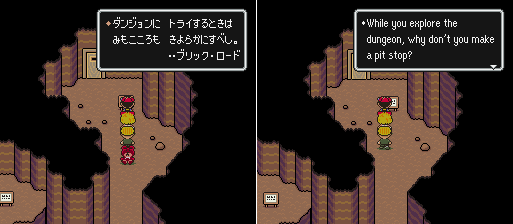 |
In EarthBound, the billboard in front of the bathroom inside Dungeon Man (man, that’s gotta be a weird sentence to non-gamers) says, “While you explore the dungeon, why don’t you make a pit stop?”
In MOTHER 2, it’s more like, “When attempting a dungeon trek, one should purify both mind and body.”
Toilet Philosophy
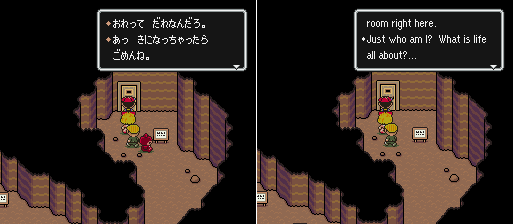 |
This guy in the Dungeon Man bathroom has some weird stuff to say for someone in his situation.
In EarthBound, he says, “I wonder why I’m in this rest room right here. Just who am I? What is life all about?… Oh, I’m sorry. Did I make you nervous? I’m not dangerous. Don’t worry.”
In MOTHER 2, it’s more along the lines of: “Hmm, what exactly am I doing in a restroom in a place like this? And just who am I? Oh, sorry if I’ve made you curious. I’m really just some unimportant guy.”
The phrase “ki ni naru” is the main trouble spot here, it can mean a lot of things, including “become curious” or “become nervous”. It’s clear it shouldn’t be “nervous” in this context, though.
Olden Style
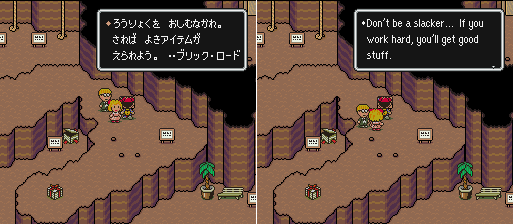 |
In EarthBound, this sign in Dungeon Man says, “Don’t be a slacker… If you work hard, you’ll get good stuff.”
In MOTHER 2, this text is actually written in a more classical, older style. I guess the best way to compare it in English might be how things are worded in the Bible or in Shakespeare. So it’s more something like, “Spare not difficult effort. Heed this rule, and great items shall be yours.”
Grassy Idiom Solution
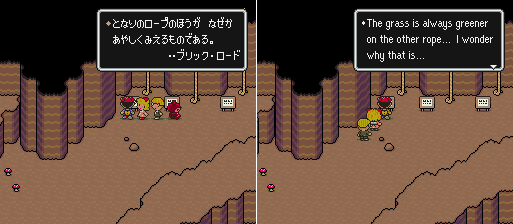 |
In EarthBound, the signs in front of all these ropes say, “The grass is always greener on the other rope… I wonder why that is.”
In MOTHER 2, the term used is “ayashiku mieru”, which would normally translate to something like, “seems suspicious” or “seems fishy”. The phrase “the grass is always greener” seems wrong at first glance, but it’s actually a really awesome and less-Engrish-y way of saying the same thing in this specific context.
Basically, I just wanted to point out that this is a line I was really impressed with in the English translation. It probably seems like “duh, it’s just a simple idiom”, but the thing is, when you’re knee-deep in translating foreign text, it’s easy to lose sight of all the options available to you. Being able to grab neat phrases and idioms that work like this is the mark of a good translator and/or editor.
Dungeon Man Haiku
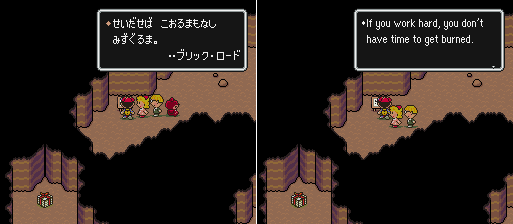 |
In EarthBound, this sign in Dungeon Man says, “If you work hard, you don’t have time to get burned.”
This always seemed strange to me as a kid, like, “Umm… okay…”
It turns out the sign has an old Japanese proverb / haiku written on it in MOTHER 2. It basically translates to something like: “If but the wheel be diligent, the water has no time to freeze.” This is in reference to those old-timey water wheels.
I would have expected the localizers to at least put their translation in haiku form too, given that they picked up on the haiku on the sign back in Threed.
Self-Referential Video Game Humor Localization
 |
In MOTHER 2, this sign says:
Failure is the MOTHER 2 of success.
As we can see, this Japanese line is a play on the famous proverb, “failure is the mother of all success”. The game also references itself by including the name “MOTHER 2” in a humorous way. However, because the game was renamed “EarthBound” for English-speaking players, this reference would’ve been meaningless nonsense in a standard, straightforward translation.
The localizers’ solution to this translation obstacle was to replace the text with a similarly-crafted line pulled out of the blue:
Learn from your mistakes. Follow this, and you’re bound to be successful in EarthBound.
Brick Road in Detail
Dungeon Man is actually just Brick Road… or is his name “Brickroad”? The localizers never did come to a consensus about that – he winds up going by both spellings throughout the game. That’s a blemish there.
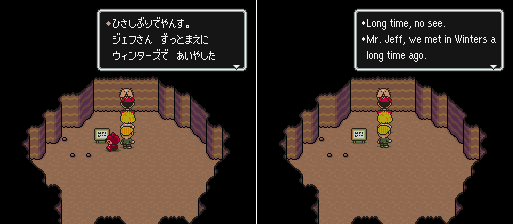 |
More importantly is the fact that Brick Road speaks in a strong and unique dialect in Japanese. Dialects are always tough to try to bring across though, especially since Japanese has a bazillion of them. Usually what happens is that translators will either shoot for a southern (as in southern United States) accent or a New York-ish accent, which almost never really does the original text justice.
If anything, I personally probably would have gone with some kind of British chimney-sweep style of talk – it sorta matches with the feel of the Japanese dialect, plus you first meet Brick Road in the EarthBound equivalent of Britain.
Dungeon Man Done
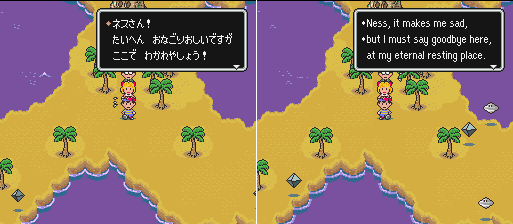 |
In EarthBound, when Dungeon Man gets stuck in the trees, he says, “Ness, it makes me sad, but I must say goodbye here, at my eternal resting place.”
In MOTHER 2, that last melodramatic part isn’t there at all. He says something more like, “Ness! I’m very sad to say this, but it looks like we must part here!”
Dungeons & Denwas
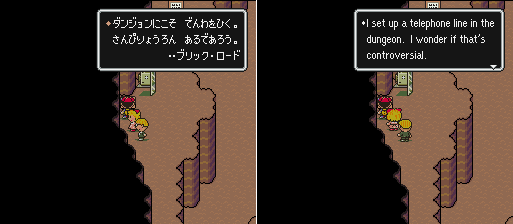 |
In EarthBound, this sign by the telephone inside Dungeon Man says, “I set up a telephone line in the dungeon. I wonder if that’s controversial.”
As a kid, this line always seemed off to me somehow. Especially since his last dungeon had a phone in it too.
In MOTHER 2, it’s actually more like, “Gotta have a phone line in a dungeon. I’m sure that has its pros and cons, of course.”
Uncertain Gift
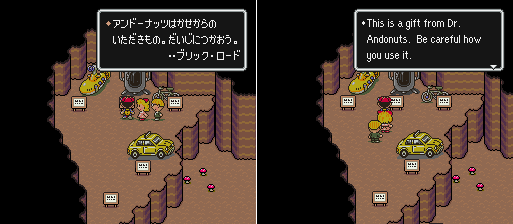 |
In EarthBound, this sign in Dungeon Man says, “This is a gift from Dr. Andonuts. Be careful how you use it.”
Which seems weird, because it’s not like it’s actually dangerous or anything. It turns out that it was probably the editor not fully understanding the nuance in the raw translation.
In MOTHER 2, this line is more like, “A gift from Dr. Andonuts. Something to be treasured.”
That second sentence, on a much more literal level – which is probably what the raw translation was in – might read like, “Let’s use it with care.” But the “care” here is in the “treasured feelings” sense, not in the “be careful” sense.
So the editor probably saw that raw translation, misinterpreted its intent (for which the fault primarily lies with the translator), and rephrased it with that misinterpretation when trying to polish up the text here. This sort of thing happens all the time in games and everything else, it’s just not obvious unless a super nerd digs into the original text like this.
Yellow Submarine
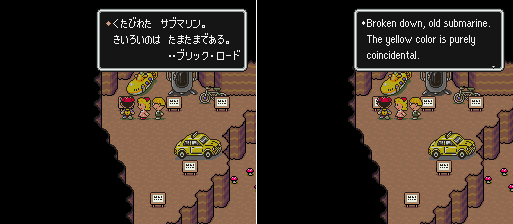 |
The text on the sign in front of the yellow submarine in Dungeon Man is the same in both MOTHER 2 and EarthBound. I just wanted to point it out here since some Beatles references exist in one version but not the other, and the question’s come up in the past if the Japanese version talks about the “purely coincidental” thing or not.
- The entrance to Dungeon Man, how it greets players differently in MOTHER 2 and EarthBound, and what significance this holds
- More information on the Japanese “water wheel” proverb + a look at how changing the theme of a translated line to its opposite can still produce the same result as the original
- A note on the Japanese spelling of “MOTHER 2”


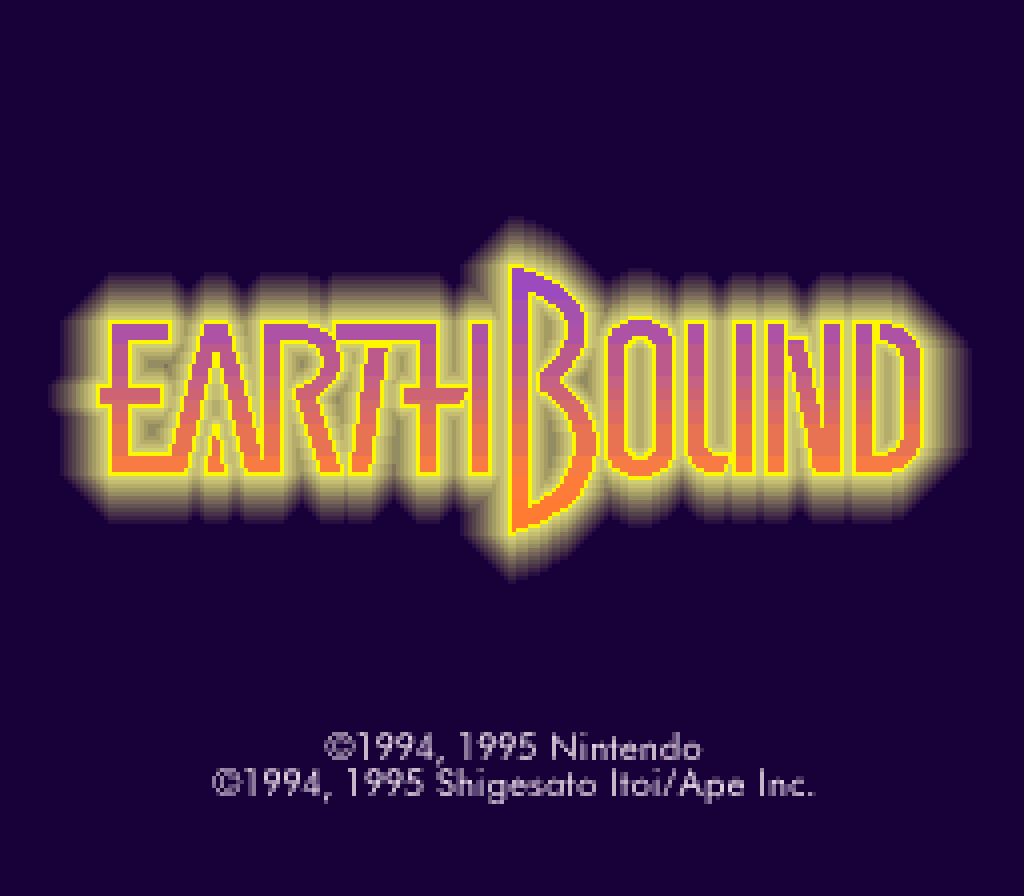
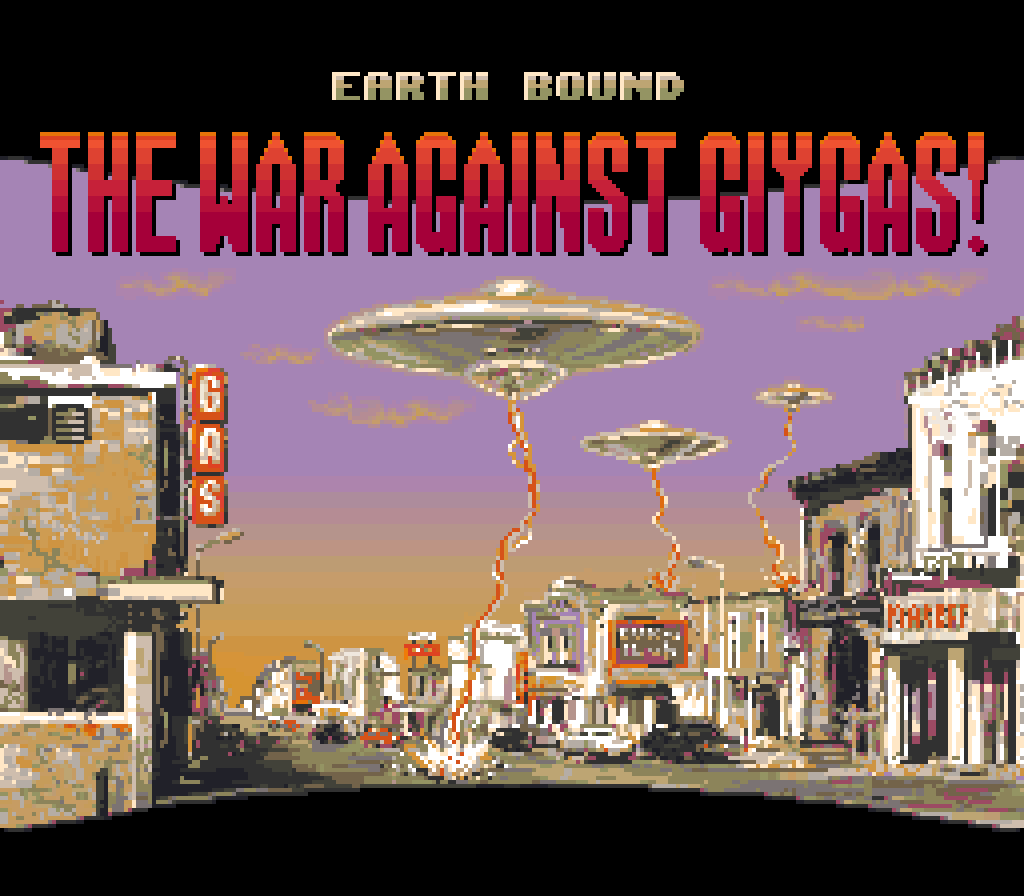
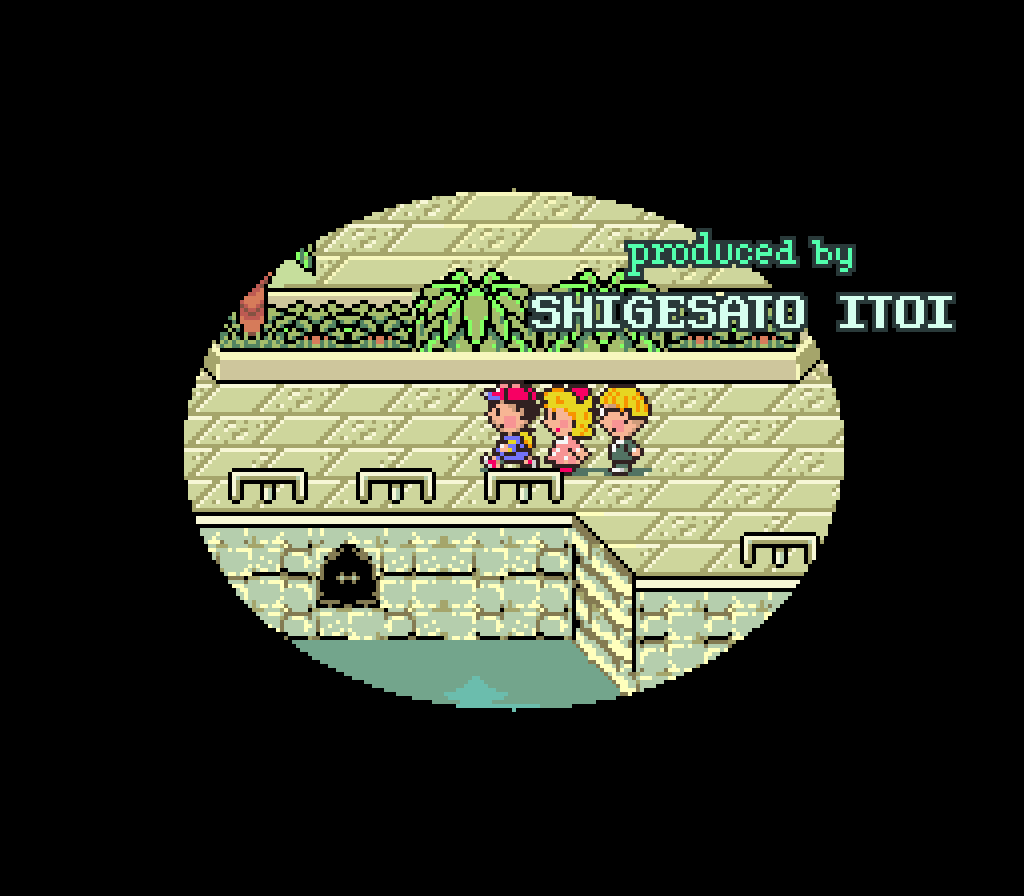
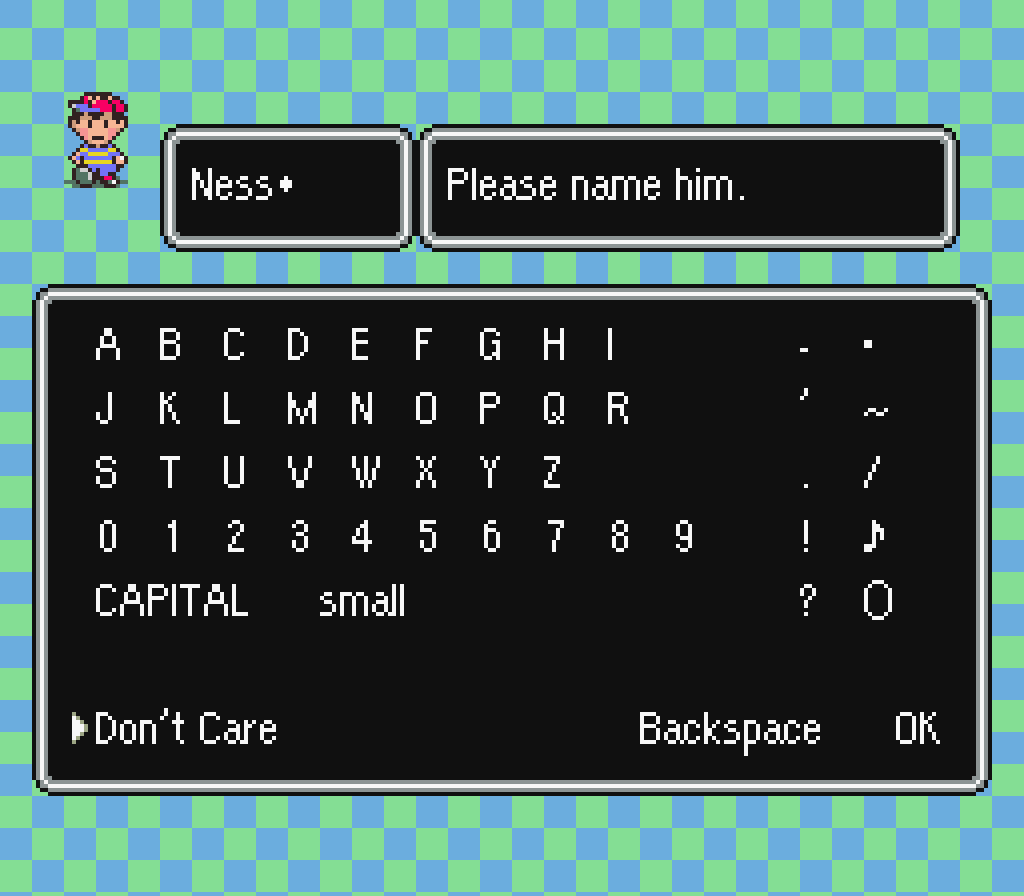
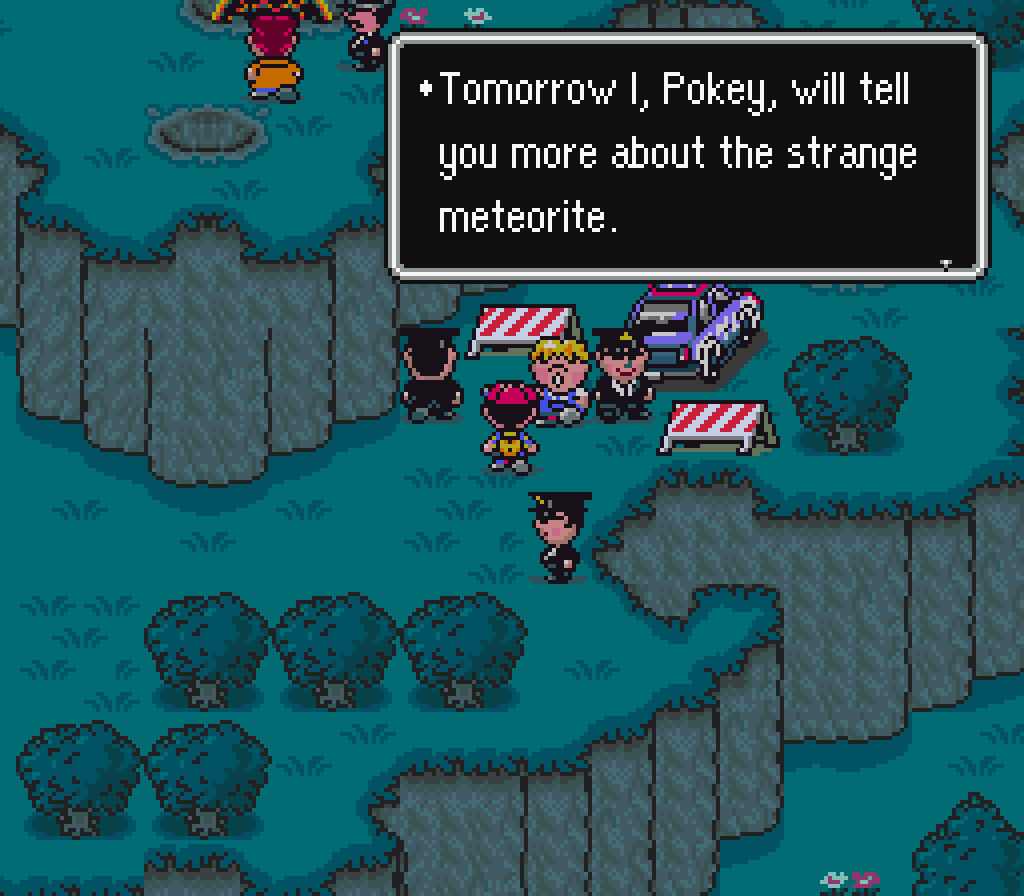
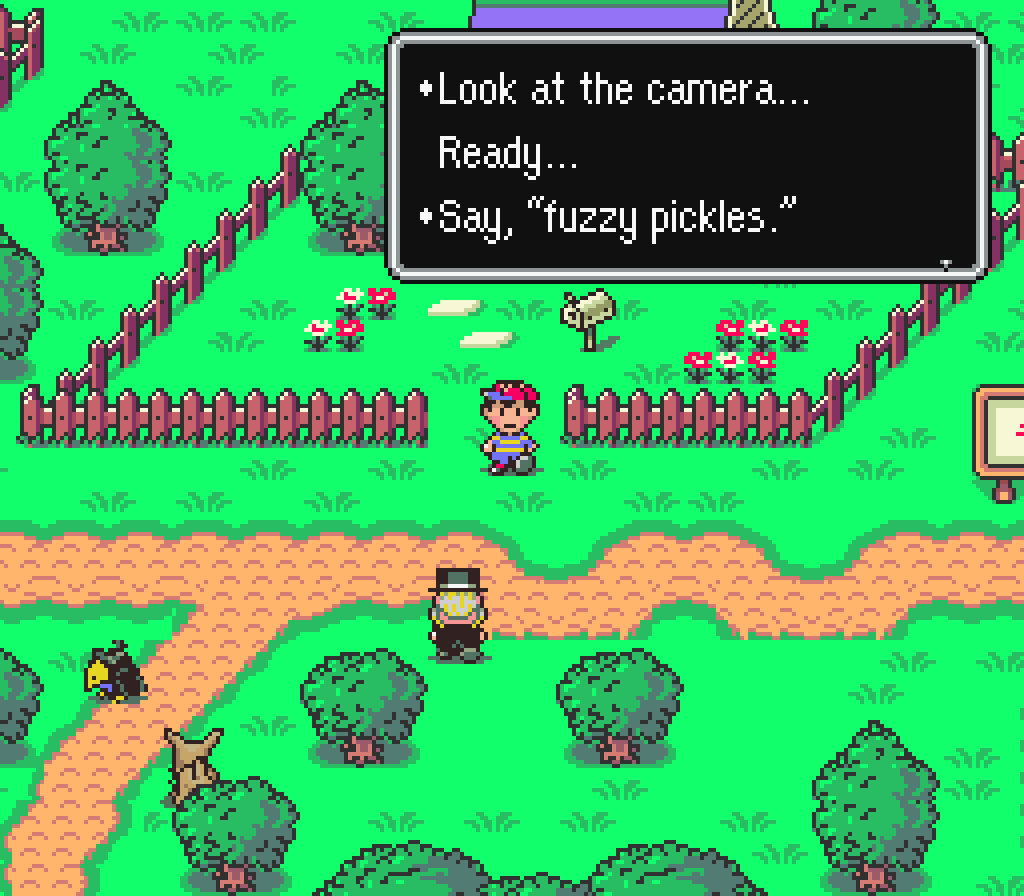
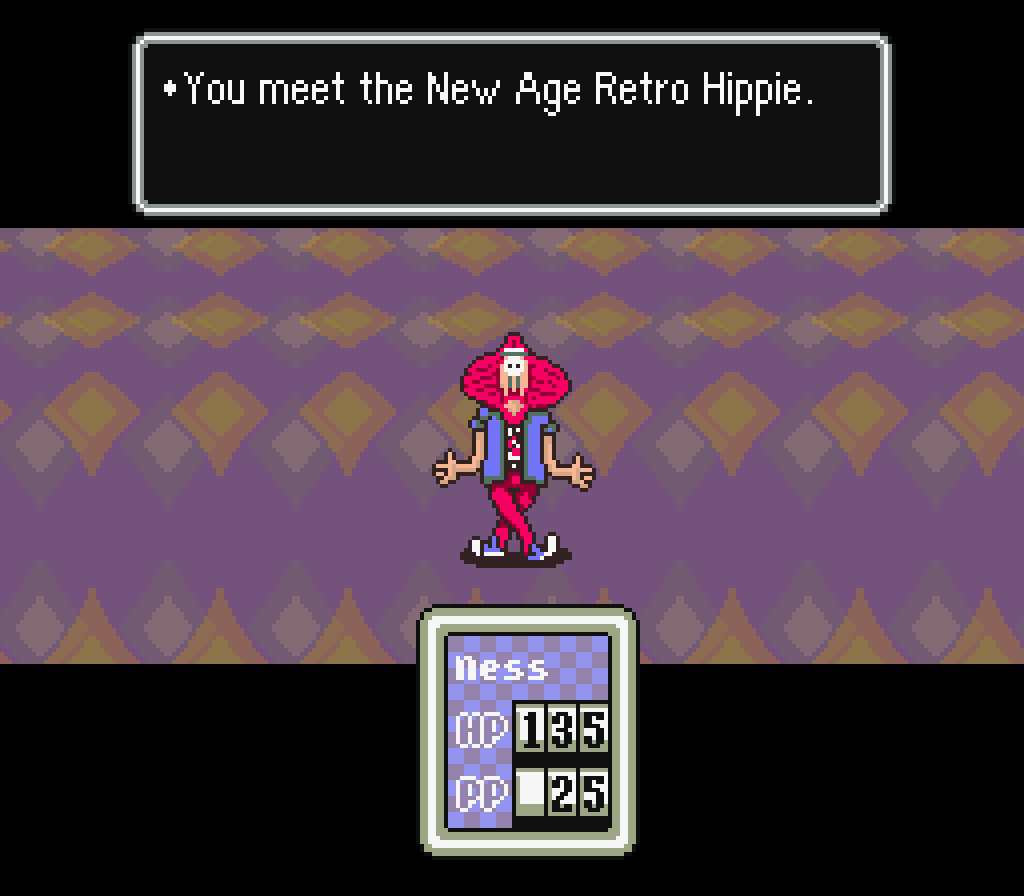
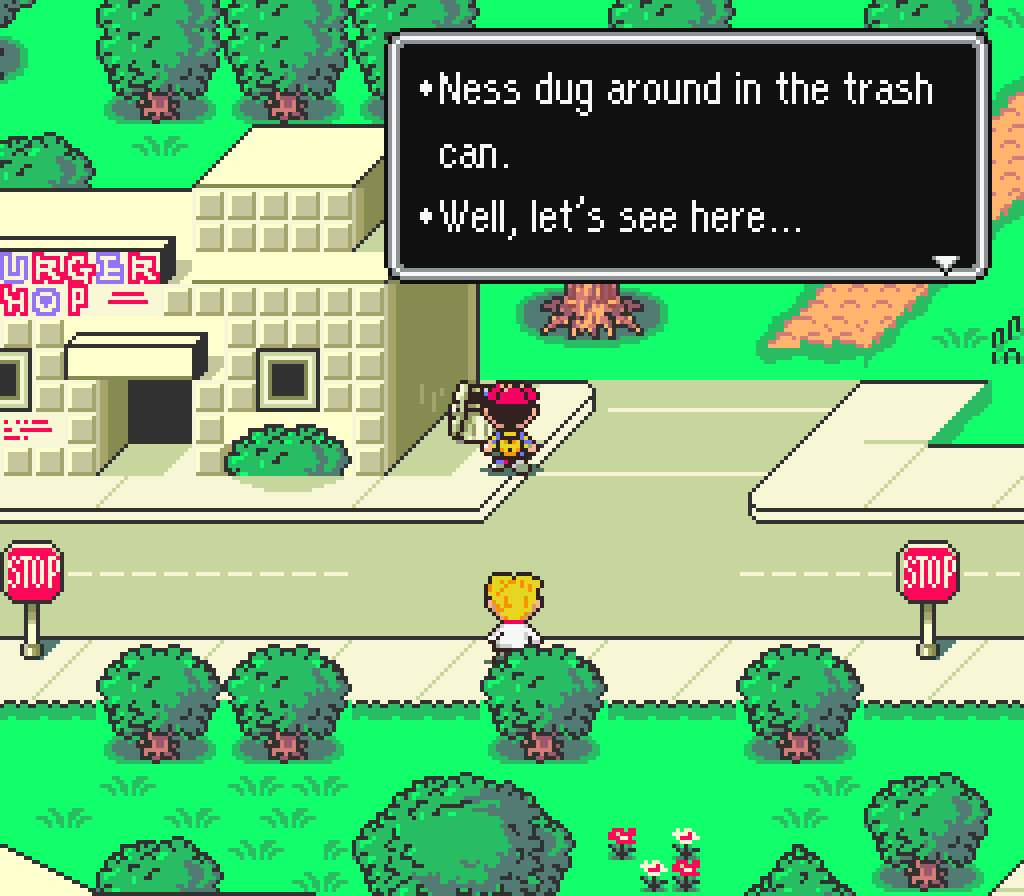
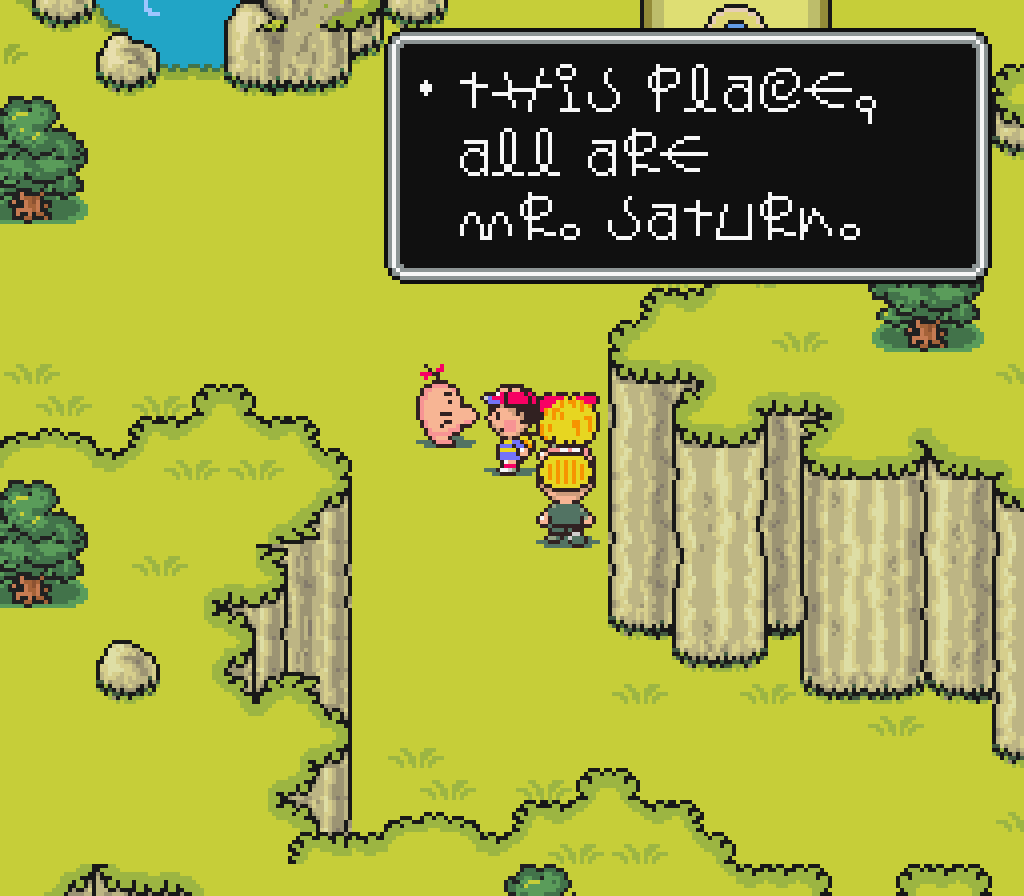
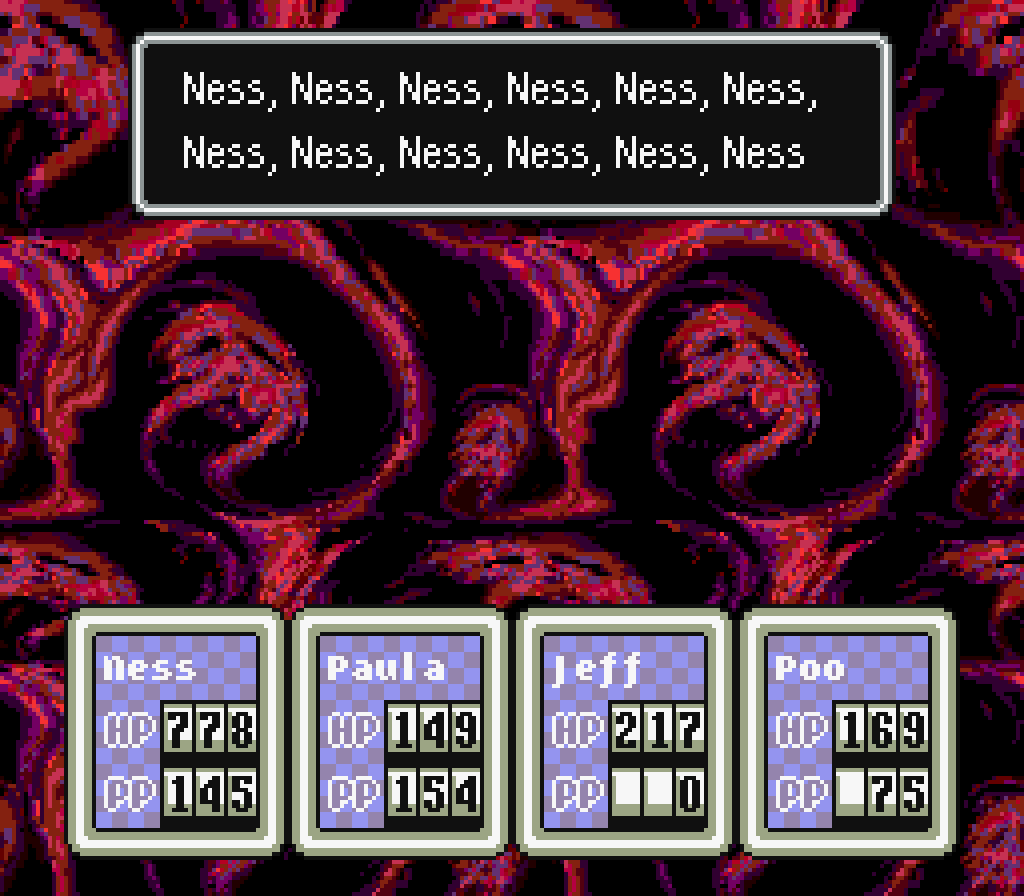
![Passport to MOTHER 2 [Learn Japanese!] Passport to MOTHER 2 [Learn Japanese!]](https://legendsoflocalization.com/wp-content/uploads/2018/05/pp-m2.jpg)
No Comments